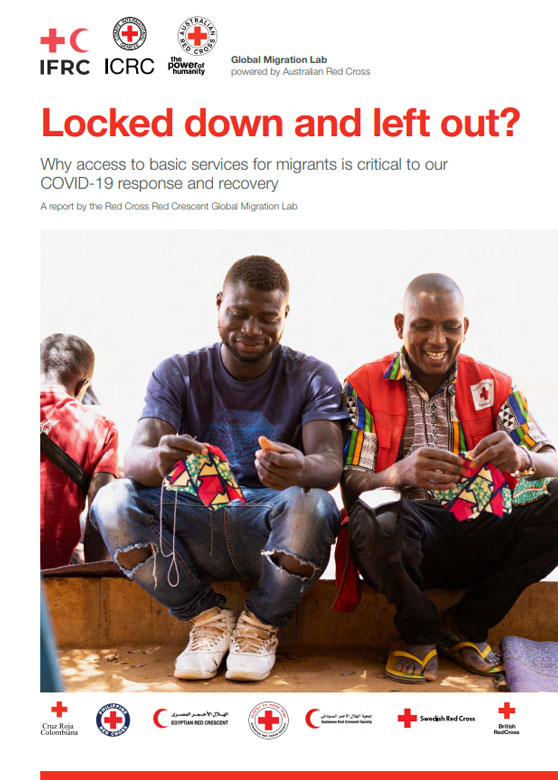“[COVID-19] turned our lives upside down …we already have trauma.”
– Refugee in Egypt.
A new report by the Red Cross Red Crescent Global Migration Lab – Locked down and left out? Why access to basic services for migrants is critical to our COVID-19 response and recovery – shows that the COVID-19 pandemic has had a significant negative impact on migrant’s mental health and while lockdowns and other measures were designed to control the spread of COVID-19, in many contexts they inadvertently increased suffering among migrants.
“Our research reveals what we are calling an ‘invisible wall’ that has blocked migrants, particularly those undocumented or in an irregular situation, from accessing basic services,” IFRC Secretary General Jagan Chapagain said in a press release.
“Interestingly, this wall isn’t built mainly of policies designed to exclude migrants,” he added. “Instead, it is made up of inadvertent exclusions, as well as the unintended consequences of efforts to contain and control the pandemic.”
As a result of the restrictions, many migrants have lost jobs and livelihoods and were subsequently unable to meet their most basic needs, leading to worsening mental health conditions. In Australia, 42% of migrants surveyed said the pandemic negatively impacted their mental health. In Sudan, 84% of migrants surveyed reported a decline in mental health.
“No sleep, no nothing. No routine, strange fear… I’ve never experienced or seen anything like that. But of course, no one’s seen anything like it though, have they?”
– Undocumented migrant in Australia.
Risks to physical health, economic insecurity, food insecurity and challenges in accessing adequate shelter to remain safe and healthy, have resulted in increased stress, anxiety and worsening mental health while mental health service are insufficient or unavailable to migrants due to lack of funding. In Sudan, 76.9% of migrants surveyed reported lack of funds to obtain health and mental health services.
In a Red Talk presenting the report and hosted by Global Lead on Migration and Displacement Zeke Simperingham, Walter, a British Red Cross and AVAIL/VOICES Project volunteer, highlighted the severity of the mental health challenges that migrant populations are facing throughout the pandemic. Walter commented on the impact of the lack of trust between migrants and governmental authorities: “During the height of the pandemic, many migrants were afraid to go to the hospital. They were afraid they would be charged [financially]. Secondly, if those who are illegal or undocumented went to the hospital, they might be detained and deported. These were the messages that were trickling throughout the migrant communities.”
The lack of trust in the government and authorities prevented migrant communities from accessing information about health services and safety procedures regarding COVID-19. According to Walter, creating a chain of trust from the migrants to the local, national and global governments is crucial for migrants to feel safe and supported in sharing their experiences and fears.
The report has been prepared by the newly established Red Cross Red Crescent (RCRC) Global Migration Lab and draws on research conducted by eight National RCRC Societies (National Societies) from Australia, Colombia, Egypt, Ethiopia, the Philippines, Sudan, Sweden and the United Kingdom.
On the Red Cross Red Crescent Global Migration Lab website, the report is available in English and Spanish – executive summary also available in Arabic and French.

